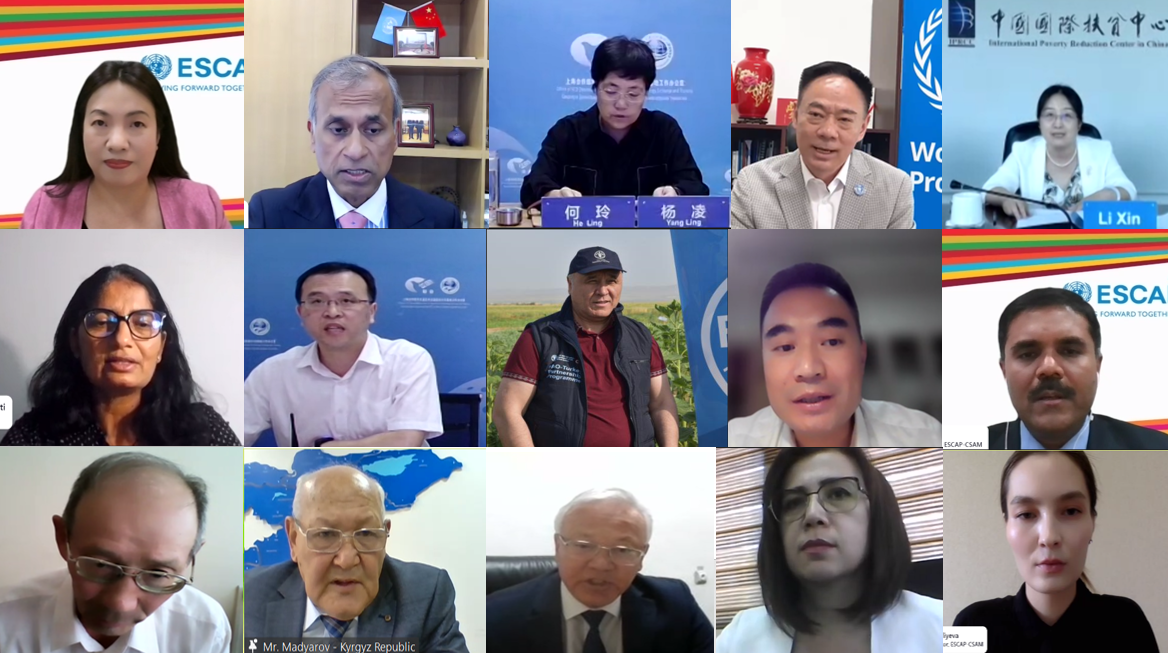ESCAP and Partners Build Capacities for Climate-smart Agricultural Mechanization in Arid and Semi-Arid Areas

Meeting Documents
28 September 2022: The Centre for Sustainable Agricultural Mechanization (CSAM) of the United Nations Economic and Social Commission for Asia and the Pacific (ESCAP) today co-organized a ‘Workshop on Climate Smart Mechanization for Transforming Agriculture in Arid and Semi-Arid Areas’ in collaboration with the Administrative Committee of Yangling Agricultural High-Tech Industry Demonstration Zone of China, the United Nations World Food Programme China Office, ESCAP’s Sub-regional Office for North and Central Asia (SONCA), as well as the International Poverty Reduction Center in China (IPRCC). The event enabled an active exchange on how innovative agricultural machinery and related technologies including digital and intelligent solutions can build resilience and support transformative change in the agricultural sector in arid and semi-arid areas such as Central Asia. Conducted simultaneously in English, Chinese and Russian languages, the event was well attended by over a hundred participants representing more than 30 countries and regions around the world, including Kazakhstan, Kyrgyzstan, Tajikistan and Uzbekistan.
Ms. Yutong LI, Head of ESCAP-CSAM, opened the workshop and delivered remarks emphasizing the significance of building capacities for countries and sub-regions such as Central Asia, which are affected by droughts and acute shortage of water resources, through the means of sharing cutting-edge mechanization technologies and good practices. Mr. Siddharth Chatterjee, United Nations Resident Coordinator in China, Ms. Ling HE, Deputy Secretary of the Administrative Committee of Yangling Agricultural High-Tech Industry Demonstration Zone, Mr. Sixi QU, Representative/Country Director of the World Food Programme China Office, and Ms. Xin LI, Deputy Director General of the International Poverty Reduction Center in China also delivered welcome remarks.
During the Session on ‘International Experience, Practice and Technology Sharing’, experts from the International Center for Agricultural Research in Dry Areas (ICARDA), Northwest Agricultural and Forestry University of China, Tashkent State Agrarian University of Uzbekistan, as well as Jiangsu University of China shared their expertise and insights on application of agricultural machinery for efficient and climate-smart agriculture, and digital and ‘intelligent’ equipment such as Unmanned Aerial Vehicles (UAV), underlining the crucial role of mechanization technologies for combating climate change threats and reducing carbon emissions from agriculture. In the following Panel Discussion, representatives from Central Asian countries, including the Academy of Agricultural Sciences of Kazakhstan, Ministry of Agriculture of Kyrgyzstan, State Unitary Enterprise ‘Tajikagroleasing’ of Tajikistan as well as Tashkent State Agrarian University, Uzbekistan, also shared their perspectives on the application of mechanization-based practices and solutions for tackling drought and water scarcity in their respective countries, and existing needs.
Overall, the workshop underscored the critical role of climate-smart mechanization in transforming agriculture in arid and semi-arid areas and helping accelerate progress towards the Sustainable Development Goals in the Asia-Pacific region and beyond. It recognized that digital and ‘smart’ technologies and equipment are becoming more and more important to cope with climate-related challenges but they need to be scaled up based on an inclusive approach that takes into account the needs of resource-poor farmers, the youth, women and elderly workers. The workshop also noted the significant scope for international and regional cooperation and exchange involving all stakeholders including governments, research and training institutions, the private sector, development partners, civil society organizations, and farmers themselves.
As another important outcome of the workshop, ESCAP (through its regional institution CSAM), the United Nations World Food Programme and the Administrative Committee of Yangling Agricultural High-Tech Industry Demonstration Zone of China reached consensus on the extension of their partnership framework to share knowledge and expertise and collaborate through relevant modalities to promote innovative and proven sustainable agricultural mechanization technologies and practices, engaging developing countries, least developed countries, or economies in transition where possible.

